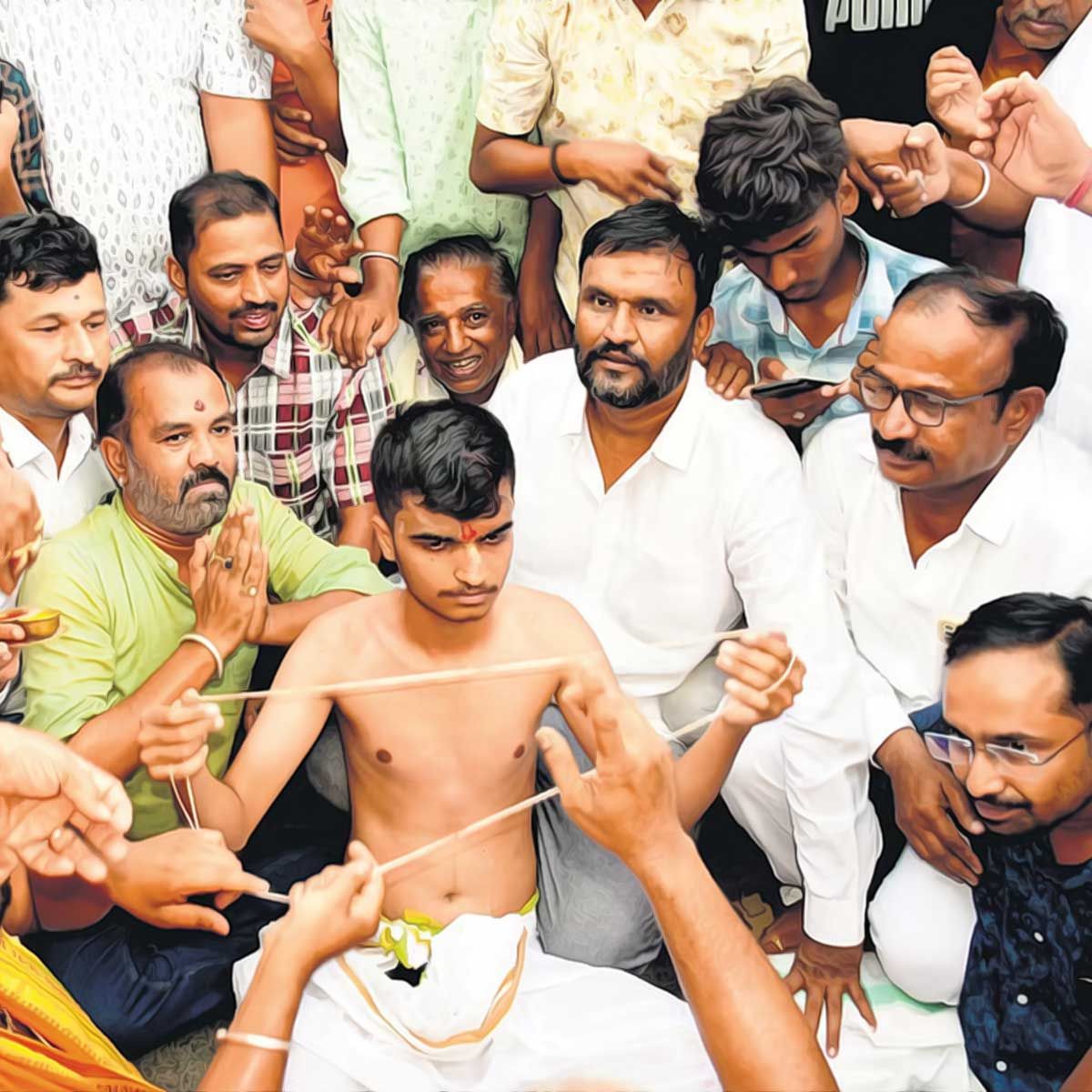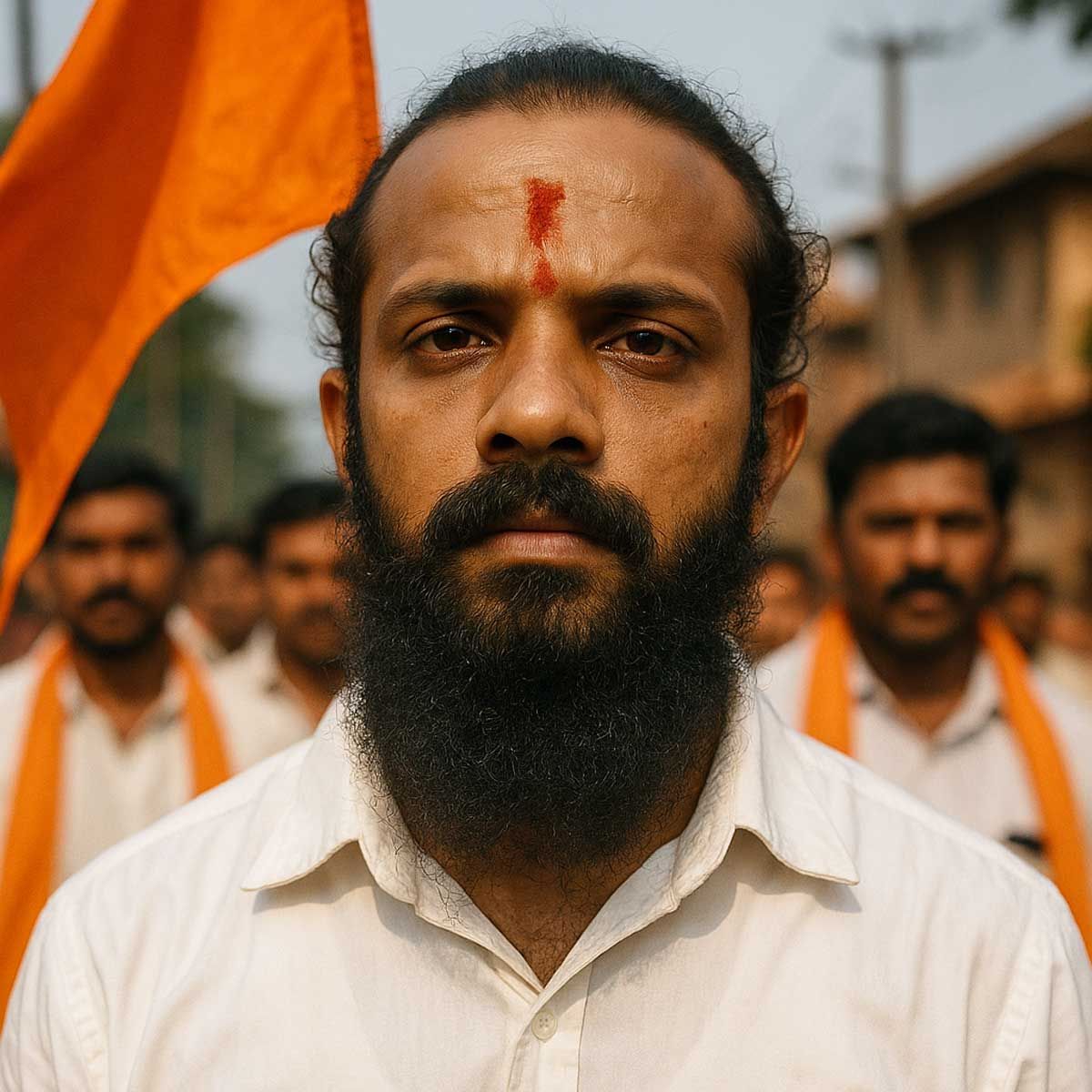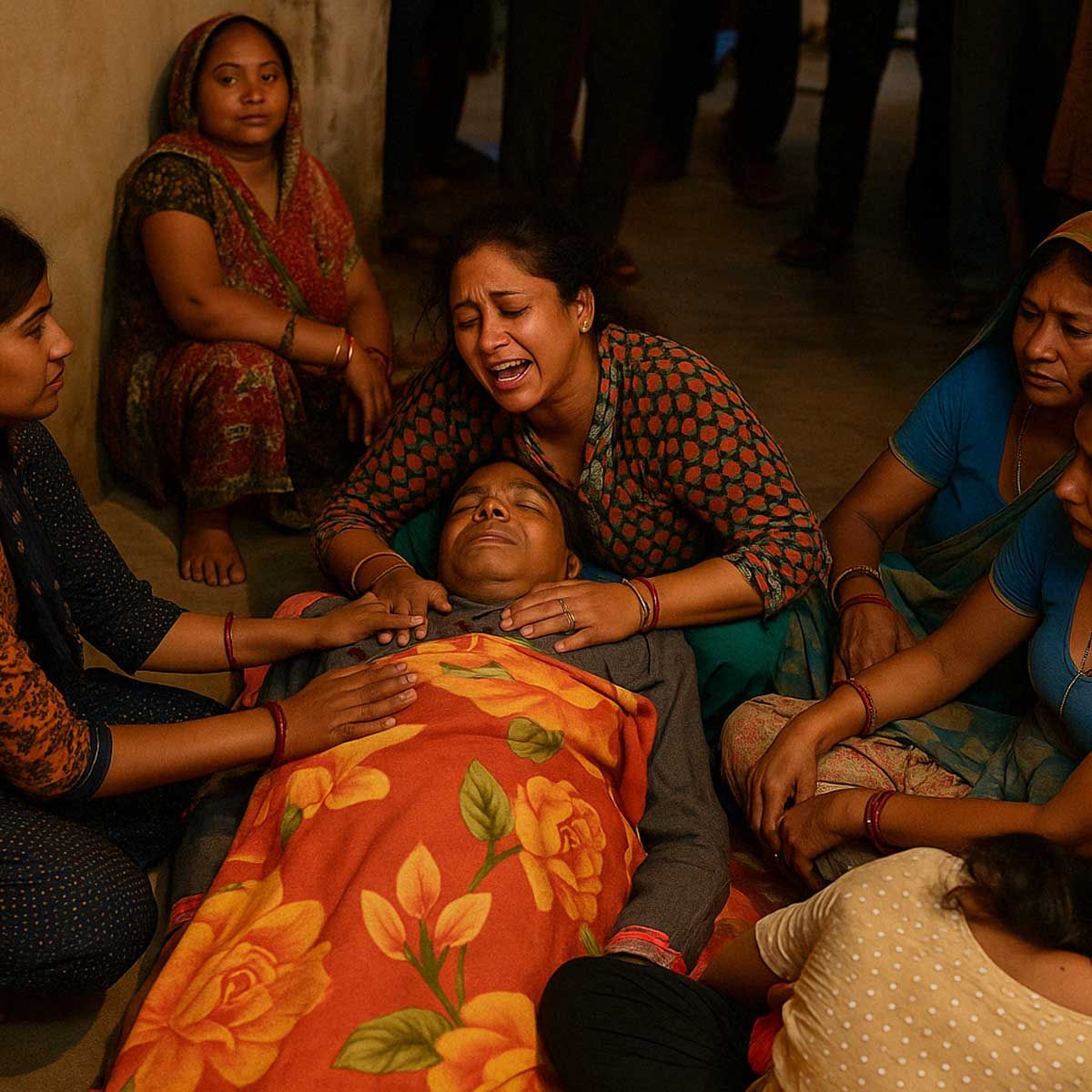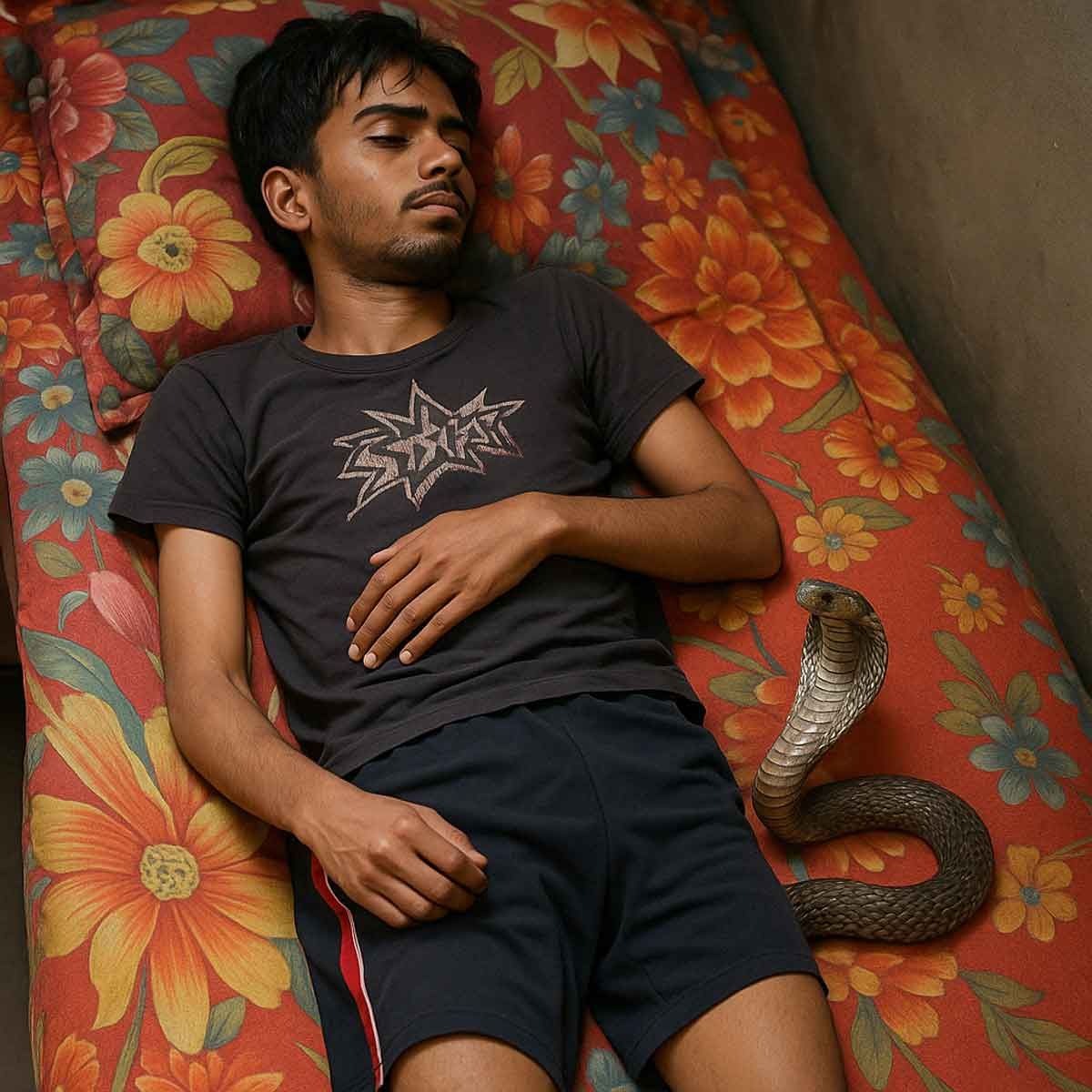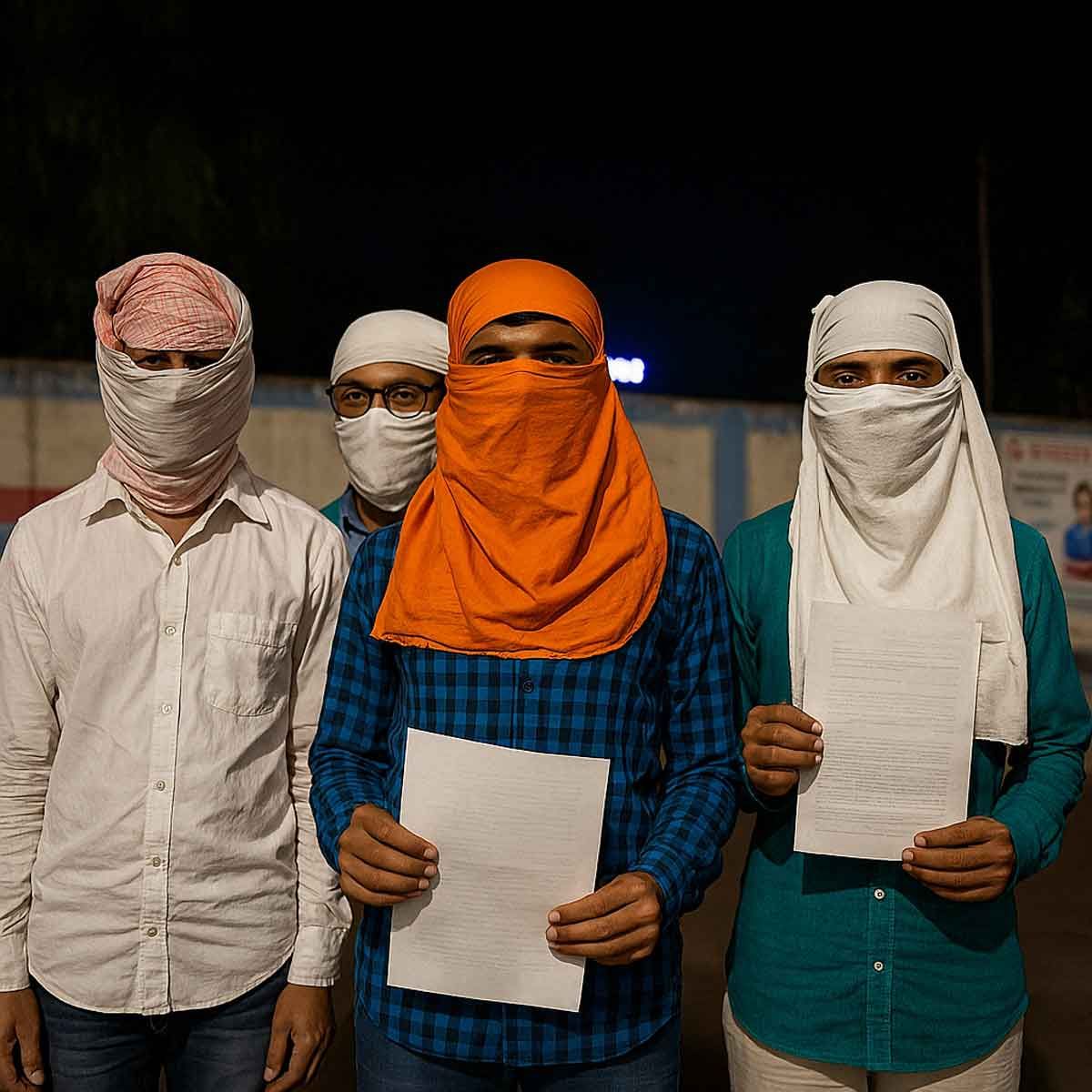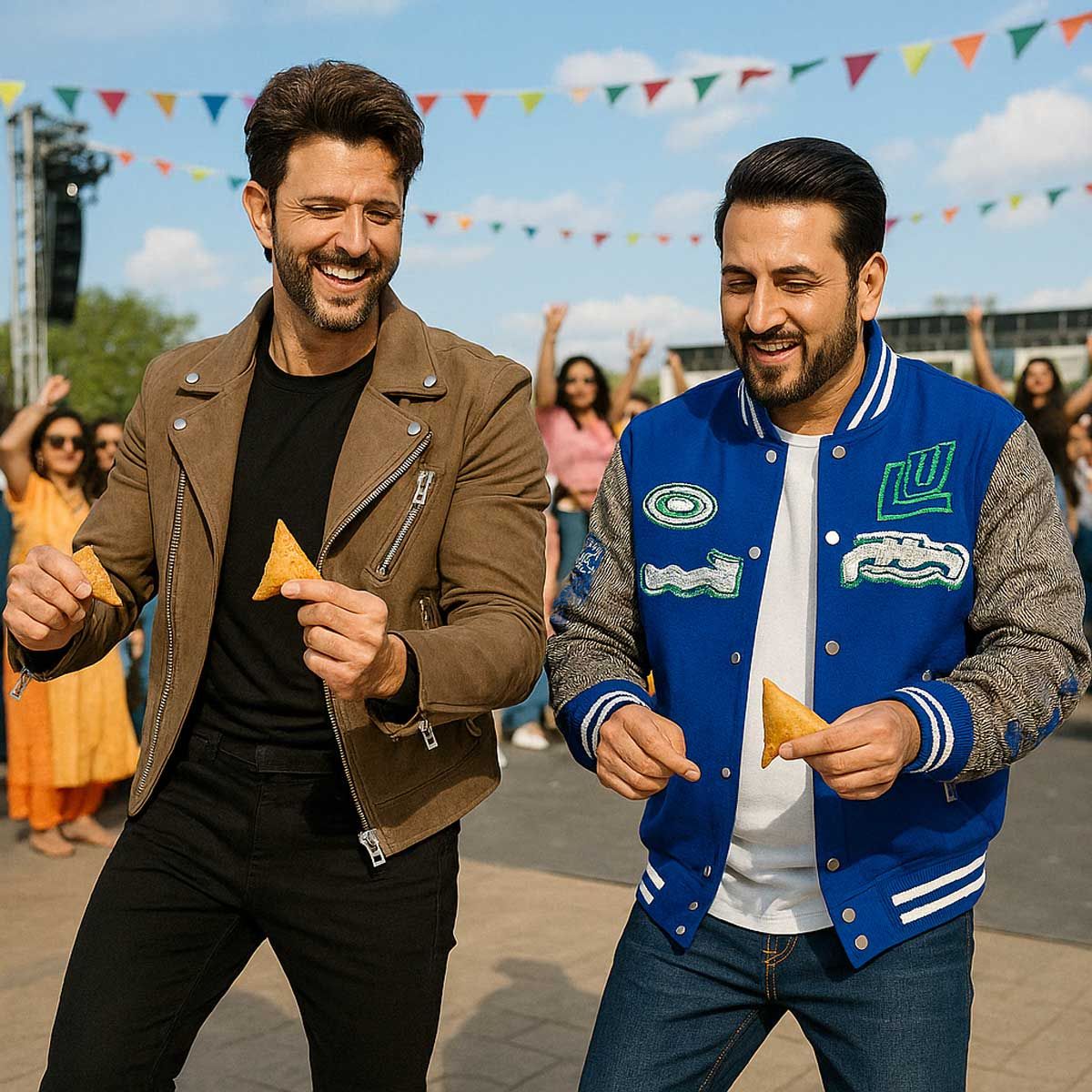More Coverage
Twitter Coverage
Satyaagrah
Written on
Satyaagrah
Written on
Satyaagrah
Written on
Satyaagrah
Written on
Satyaagrah
Written on
JOIN SATYAAGRAH SOCIAL MEDIA
"Karma Strikes": Decade-long patience culminates as Delhi's LG sanctions Arundhati Roy's prosecution for her divisive 2010 speech, with BJP countering Chidambaram's remarks and the case gaining momentum, India's stand against sedition takes center stage
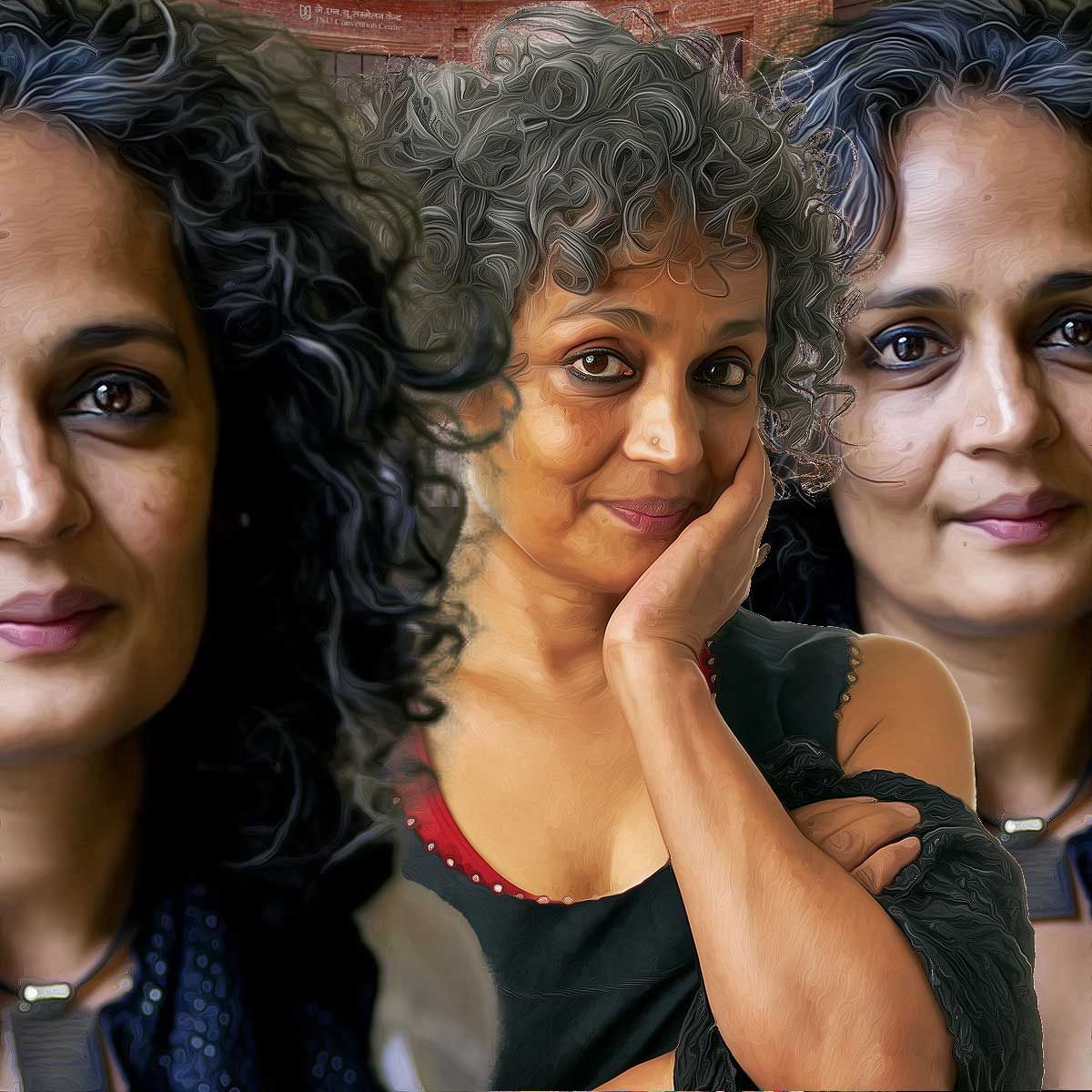
In what seems like a long-overdue stand against attempts to dismantle the fabric of our nation, Delhi Lt Governor V K Saxena has finally signaled the green light for the prosecution of author Arundhati Roy. Not only did she allegedly make controversial speeches, but she also endorsed views that advocated for the "Separation of Kashmir from India". It's high time figures of influence like Roy are held accountable for their actions, especially when those actions reek of anti-national sentiment.
|
Roy, often hailed by some as a voice of dissent, now finds herself in murky waters along with former Kashmiri professor Sheikh Showkat Hussain. Both have been embroiled in this case since 2010, highlighting the lingering shadows of their contentious words.
Officials from Raj Niwas confirmed on Tuesday about the action against Roy and Hussain, who were implicated following the orders of the Court of Metropolitan Magistrate, New Delhi. This move showcases a commitment to upholding the unity and integrity of our nation against any divisive rhetoric, no matter how influential the speaker.
The legal proceedings have been initiated under Section 196 of the Criminal Procedure Code. It's a clear indication of the seriousness with which the state views such provocations. It essentially mandates the state's permission to prosecute offences of this nature, reflecting its gravity.
The FIR, which paved the way for this firm action, was registered on November 28, 2010, at Tilak Marg Police Station. This was all made possible thanks to a complaint lodged by Sushil Pandit, a dedicated social activist hailing from Kashmir. It's worth noting the efforts of individuals like Pandit, who, amidst potential backlash, stood up for the unity of India and against those who seemingly work against it.
|
The Controversial 'Azadi – The Only Way' Conference: Roy and Hussain Under Fire
It's worth delving deeper into the reasons that led to this firm stand against Arundhati Roy and Sheikh Showkat Hussain. Back in 2010, both were allegedly at the forefront of a conference titled “Azadi – The Only Way.” Organized by the Committee for Release of Political Prisoners, the event became a platform for some provocative rhetoric. The complainant underscores the apparent audacity with which Roy, Hussain, and other speakers vocalized their contentious views.
But it wasn't just Roy and Hussain who found themselves in the eye of this storm. Two other key figures associated with the case were Kashmiri separatist leader Sayed Ali Shah Geelani and Syed Abdul Rahman Geelani. The latter, a lecturer from Delhi University, had been acquitted by the Supreme Court in a high-profile Parliament attack case. Unfortunately, both Geelanis passed away while the case was still ongoing, rendering the legal proceedings against them inconclusive.
Amidst the intricate legal web, it is notable that Roy and her counterparts were not just slapped with routine charges. They were charged under the sedition laws, highlighting the seriousness of the accusations against them. However, given the complexities surrounding Section 124A of IPC, currently pending in the Supreme Court, a decision on the sedition charges is still in limbo, as shared by an L-G House official.
This evolving case acts as a reminder: India remains committed to safeguarding its integrity and unity against divisive agendas, regardless of the stature or influence of the individuals championing them.
Delhi Police, in its bid to secure a conviction against both Arundhati Roy and Dr. Sheikh Showkat Hussain, had sought a broad spectrum of sanctions. The charges encompassed sections 153A, 153B, 504, 505 of the Indian Penal Code (IPC) and the particularly stringent Section 13 of the Unlawful Activities (Prevention) Act (UAPA). It's worth noting that Section 13 of the UAPA is not to be taken lightly. This section stands as a bulwark against those advocating, abetting, or inciting any form of unlawful activity. The penalties for this are severe, with imprisonment extending up to a daunting seven years.
However, Delhi's Lt Governor V K Saxena, after reviewing the evidence presented, provided sanctions only under specific provisions of the IPC. In his statement, he firmly mentioned that there seems to be a clear-cut case against Roy and Dr. Hussain. Their positions, one an acclaimed author and the other a former Professor of International Law at Central University of Kashmir, didn't shield them from the weight of the law.
|
The charges sanctioned against them are significant:
- Section 153A pertains to promoting enmity between different societal groups, potentially leading to actions that disrupt harmony.
- Section 153B revolves around making imputations or assertions that can negatively affect national integration.
- Section 505 addresses statements that may lead to public mischief.
A statement from Raj Niwas re-emphasized these sanctions, underscoring their pertinence given the speeches both delivered at a public event in the heart of the nation. This unfolding saga stands as a testament to India's commitment to upholding the principles enshrined in its constitution and maintaining harmony within its diverse populace.
India's legal system, with its comprehensive penal code, is designed to ensure that the diverse fabric of its society remains cohesive and that elements that may disturb this cohesion are kept in check. Three specific sections of the Indian Penal Code (IPC) come to the forefront in the ongoing case against Arundhati Roy and Dr. Sheikh Showkat Hussain: Sections 153A, 153B, and 505. These provisions are foundational in upholding India's harmony and unity, and their enforcement is imperative.
Section 153A of the IPC is geared towards preventing acts that may fuel discord among the various groups that make up India's mosaic of cultures. It specifically addresses actions that promote enmity based on differences in religion, race, place of birth, language, and more. In essence, it safeguards the harmony that India cherishes.
Section 153B steps in to counter assertions or claims that can harm national unity. Such imputations could be a detriment to India's integrated identity, and hence, actions under this section can be viewed as paramount to preserving national integration.
Furthermore, Section 505 of the IPC is structured to tackle those intentional insults or provocations that may lead to a breach of peace. A society's peace and stability often hinge on the responsible behavior of its citizens, and this section serves as a protective measure against potential disruptions.
The necessity for valid sanctions from the state government for the prosecution of certain offenses, as specified under Section 196(1) of the Code of Criminal Procedure (CrPC), is an essential facet of the legal proceedings. These sanctions are mandatory for specific severe charges like hate speech, sedition, waging war against the state, and promoting enmity, among others. This protocol ensures that charges are not levied lightly and are backed by the state's due diligence.
It's also poignant to note that two other individuals, Kashmiri separatist leader Sayed Ali Shah Geelani and Delhi University lecturer Syed Abdul Rahman Geelani (who faced charges related to the Parliament attack but was acquitted on technicalities by the Supreme Court), were also implicated in this case. However, their demises during its pendency render their specific legal proceedings moot.
The unfolding developments around this case underscore the delicate balance that India strives to maintain – ensuring freedom of expression while also safeguarding its unity and integrity.
A central figure in the case against Arundhati Roy and Dr. Sheikh Showkat Hussain is Sushil Pandit, a prominent social activist hailing from Kashmir. His concerns, detailed in a complaint lodged on October 28, 2010, serve as a significant basis for the legal actions now taken against those accused.
The crux of Pandit's complaint was centred around a conference organized by the 'Committee for the Release of Political Prisoners (CRPP)' under the provocative banner of "Azadi - The Only Way". The event, which took place on October 21, 2010, witnessed a congregation of various speakers, who, according to Pandit's allegations, delivered speeches that can best be described as "incendiary."
Pandit expressed grave concerns about the themes broached during the conference. He contended that there was a significant emphasis on the topic of the "Separation of Kashmir from India." Such discussions, particularly when presented in a public forum, have the potential to fan the flames of separatism and dissent, thus threatening India's territorial integrity.
Moreover, beyond the mere content of the speeches, it was the tone and intent behind them that alarmed Pandit. He alleged that these speeches were not just discussions, but were provocative in essence. By potentially inciting sentiments against the unity of India, these speeches posed a threat to public peace and security.
The accusations brought forth by Pandit underscore the delicate balance between freedom of speech and the responsibility that comes with it. While discussions and debates are the lifeblood of a democratic nation, they must be carried out with a sense of duty, ensuring that they don't compromise the nation's harmony and security.
 |
A Hilarious Turn of Events: BJP explains sanction for Arundhati Roy's prosecution to counter Chidambaram's 'no tolerance' dig
Oh, the times! It's nothing short of delightful when life seems to serve a good old dose of irony, making us mere spectators of this dramatic turn of events. The very latest in this saga of comic tragedy surrounds author Arundhati Roy, a known advocate of every cause against the Indian establishment.
So, what's the recent buzz? Delhi lieutenant governor VK Saxena, in a move that left many smirking, has given a nod for prosecuting our dear Roy. But wait, it gets even better! Enter stage left: Congress stalwart P Chidambaram, riding in like a knight in tarnished armor, rushing to Roy's aid. But, oops! Here's the catch – Chidambaram was the home minister when Arundhati Roy delivered that infamous speech back in 2010. Oh, sweet irony!
The ever-vocal Chidambaram quickly jumped on the bandwagon to preach about tolerance, conveniently forgetting his past role. He eloquently stated that "under the rule of the LG (and his masters)" the world has become a bleak place where the sun of tolerance never shines. But one can't help but ponder – wasn't it under his watchful gaze that the entire saga began? It's like watching a cat chase its tail, entertaining yet utterly pointless.
Mr. Chidambaram went on to sing praises of freedom of expression and waxed lyrical about the 'colonial law of sedition.' It's a bit like a fox discussing the merits of chicken protection, isn't it? Though he advocates for the abolishment of Section 124A, stating it's often misused, he seems to forget its convenient usage during his tenure.
In conclusion, while the debate on freedom of speech and sedition continues, it's hard not to indulge in a chuckle or two. As they say, Karma has a wonderful way of sneaking up, and when it hits, it surely brings the house down! So, grab some popcorn, folks! The show has just begun.
Continuing our journey into the theater of the absurd, let's shed a spotlight on the latest act, starring none other than Mr. Chidambaram, who served as the Union home minister in 2010. Now, here's where things get deliciously twisted: it was during his reign that Arundhati Roy made her now-infamous "Azaadi speech."
Fast forward to the present, and our protagonist Chidambaram, in an attempt to dazzle us with his memory skills, recalls his stance from 2010, confidently declaring that he stands by what he said back then. According to him, there was no justification for filing a case against the "famous writer and journalist Ms. Arundhati Roy" on charges of treason. He reminiscences about the good old days when he gallantly stood up and announced that the Delhi Police's decision to refrain from filing a case against Roy was "in accordance with the letter and spirit of the law."
But here's where the plot thickens. As the tables turn and time shifts, Chidambaram's past decisions come back to haunt him. Was it genuine concern for freedom of speech that motivated him in 2010, or were there other hidden narratives at play?
In the end, the whole saga is reminiscent of a dramatic soap opera, where past decisions, declarations, and deeds make unexpected comebacks, leaving the audience (that's us!) on the edge of their seats. So, as the curtains slowly draw on this act, one can't help but eagerly await the next twist in the tale!
The political arena is a playground where shadows often eclipse substance, and nothing stands testament to this more than the latest verbal duel between BJP's Amit Malviya and Congress stalwart P Chidambaram. In the recent volley of words, Malviya accused Chidambaram of, and let's put this delicately, 'jumping the gun' in his haste to 'earn brownies' from his 'Faux Liberal Casteist and Dynastic Masters'. Those are some heavily loaded terms, aren't they? Malviya's criticism stems from Chidambaram's impassioned defence of Arundhati Roy, suggesting that he might have glossed over a few pertinent details.
Drawing attention to specifics, Malviya clarified that the LG had not sanctioned Arundhati Roy’s prosecution under the controversial Section 124A (Sedition) of IPC. This was deliberately sidestepped since the matter rests with a Constitutional Bench of the Supreme Court. Instead, the author faces potential prosecution under Sections 153A, 153B, and 505 of the IPC. As Malviya pointedly put it, "facts hardly matter when arrogance rules the head." Ouch.
It’s a curious juxtaposition – 13 years after a speech, the ripple effects still cascade across the political landscape. While Arundhati Roy and Professor Sheikh Showkat Hussain might be the ones facing prosecution, it’s the collateral exchanges that truly capture the imagination.
Arundhati Roy's Infamous Oratory: A Walk Down Memory Lane
It seems every era has its hallmark moments, events that resonate long after they've occurred. October 21, 2010, was one such day when the voices at a conference echoed louder than perhaps anticipated. The gathering, spearheaded by the Committee for Release of Political Prisoners, held under the evocative banner, 'Azadi - The Only Way', sought to shed light on political incarceration and the quest for freedom.
Arundhati Roy, known for her piercing narratives and unfiltered commentary, took to the stage, weaving her thoughts for the attendees. Like a stone thrown in a pond, her words caused ripples, some of which turned into waves of contention. A mere month after the conference, on November 27, 2010, an FIR was registered in New Delhi. The heart of the complaint? That Roy, along with other orators, had delivered speeches that were more incendiary than informative.
While time has passed since that day, the shadows cast by that conference and the speeches therein continue to loom large in public discourse. The events of that day, like a haunting refrain, serve as a constant reminder of the delicate balance between freedom of expression and the responsibility that accompanies such freedom.
Seditious speech?
Here is a transcript of Arundhati Roy’s speech at a seminar called “Azadi – the only Way” in Delhi on October 21, 2010. On the basis of this text a Delhi magistrate's court has ordered the police to file an FIR against her and several others for sedition and waging war against the state. The magistrate's order came after the police statement to the court said that no case could be made out on the basis of the speeches made on the occasion.
S.A.R GEELANI: Now I request Arundhati Roy to come and speak.
Arundhati Roy: If anybody has any shoes to throw, please throw them now ..
Some people in the audience: we’re cultured…etc..etc
Arundhati Roy: Good, I’m glad. I’m glad to hear that. Though being cultured is not necessarily a good thing. But anyway..
S.A.R GEELANI: Please, will you talk afterwards. Now prove that you are cultured.
Arundhati Roy: About a week or 10 days ago, I was in Ranchi where there was a Peoples’ Tribunal against Operation Green Hunt— which is the Indian state’s war against the poorest people in this country—and at that tribunal, just as I was leaving, a TV journalist stuck a mic in my face and very aggressively said “Madam, is Kashmir an integral part of India or not? Is Kashmir an integral part of India or not?” about five times. So I said, look Kashmir has never been an integral part of India. However aggressively and however often you want to ask me that. Even the Indian government has accepted, in the UN that it’s not an integral part of India. So why are we trying to change that narrative now. See in 1947, we were told that India became a sovereign nation and a sovereign democracy, but if you look at what the Indian state did from midnight of 1947 onwards, that colonised country, that country that became a country because of the imagination of its coloniser— the British drew the map of India in 1899— so that country became a colonising power the moment it became independent, and the Indian state has militarily intervened in Manipur, in Nagaland, in Mizoram.. (Someone’s phone rings here).. in Mizoram, in Kashmir, in Telangana, during the Naxalbari uprising, in Punjab, in Hyderabad, in Goa, in Junagarh. So often the Indian government, the Indian state, the Indian elite, they accuse the Naxalites of believing in protracted war, but actually you see a State—the Indian State—that has waged protracted war against its own people or what it calls its own people relentlessly since 1947, and when you look at who are those people that it has waged war against— the Nagas, the Mizos, the Manipuris, people in Assam, Hyderabad, Kashmir, Punjab—it’s always a minority, the Muslims, the Tribals, the Christians, the Dalits, the Adivasis, endless war by an upper caste Hindu state, this is what is the modern history of our country. Now, in 2007, at the time of the uprising in Kashmir against that whole acquisition of land for the Amarnath Yatra, I was in Srinagar and I was walking down the road and I met a young journalist, I think he was from Times of India, and he said to me—he couldn’t believe that he saw some Indian person—walking alone on the road— and he said, “can I have a quote?”, so I said, “Yes, do you have a pen? Because I don’t want to be misquoted” and I said, “write down—India needs azaadi from Kashmir just as much as Kashmir needs azaadi from India”, and when I said India, I did not mean the Indian state, I meant the Indian people because I think that the occupation of Kashmir. Today there are 700,000 security personnel manning that valley of 12 million people— it is the most militarised zone in the world— and for us, the people of India, to tolerate that occupation is like allowing a kind of moral corrosion to drip into our blood stream. So for me it’s an intolerable situation to try and pretend that it isn’t happening even if the media blanks it out, all of us know…..or maybe all of us don’t know….but any of us who’ve visited Kashmir know— that Kashmiris cannot inhale and exhale without their breath going through the barrel of an AK-47. So, so many things have been done there, every time there’s an election and people come out to vote, the Indian government goes and says—“Why do you want a referendum? There was a vote and the people have voted for India.” Now, I actually think that we need to deepen our thinking a little bit because I too am very proud of this meeting today, I think it’s a historic meeting in some ways, it’s a historic meeting taking place in the capital of this very hollow superpower, a superpower where 830 million people live on less than 20 rupees a day. Now, sometimes it’s very difficult to know from what place one stands on as formally a citizen of India, what can one say, what is one allowed to say, because when India was fighting for independence from British colonisation— every argument that people now use to problematize the problems of azaadi in Kashmir were certainly used against Indians. Crudely put, “the natives are not ready for freedom, the natives are not ready for democracy”, but every kind of complication was also true, I mean the great debates between Ambedkar and Gandhi and Nehru – they were also real debates and over these last 60 years whatever the Indian State has done, people in this country have argued and debated and deepened the meaning of freedom. We have also lost a lot of ground because we’ve come to a stage today where India a country that once called itself Non-Aligned , that once held its head up in pride has today totally lain down prostrate on the floor at the feet of the USA. So we are a slave nation today, our economy is completely—however much the Sensex may be growing, the fact is the reason that the Indian police, the paramilitary and soon perhaps the army will be deployed in the whole of central India is because it’s an extractive colonial economy that’s being foisted on us. But the reason that I said what we need to do is to deepen this conversation is because it’s also very easy for us to continue to pat ourselves on the backs as great fighters for resistance for anything whether it’s the Maoists in the forests or whether it’s the stone pelters on the streets— but actually we must understand that we are up against something very serious and I’m afraid that the bows and arrows of the Adivasis and the stones in the hands of the young people are absolutely essential but they are not the only thing that’s going to win us freedom, and for that we need to be tactical, we need to question ourselves, we need to make alliances, serious alliances…. Because… I often say that in 1986 when capitalism won its jihad against soviet communism in the mountains of Afghanistan, the whole world changed and India realigned itself in the unipolar world and in that realignment it did two things, it opened two locks , one was the lock of the Babri Masjid and one was the lock of the Indian markets and it ushered in two kinds of totalitarianism- Hindu fascism, Hindutva fascism and economic totalitarianism and both these manufactured their own kinds of terrorism. So you have Islamist “terrorists” and the Maoist “terrorists”— and this process has made 80 per cent of this country live on 20 rupees a day but it has divided us all up and we spend all our time fighting with each other when in fact there should be deep solidarity. There should be deep solidarity between the struggles in Manipur, the struggles in Nagaland, the struggle in Kashmir, the struggle in central India and in all the poor, squatters, the vendors , all the slum dwellers and so on. But what is it that should link these struggles? It’s the idea of Justice because there can be struggles which are not struggles for justice, there are peoples movements like the VHP is a peoples movement—but it’s a struggle for fascism, it’s a struggle for injustice, we don’t align ourselves with that. So every movement, every person on the street, every slogan is not a slogan for justice. So when I was in Kashmir on the streets during the Amarnath Yatra time, and even today— I haven’t been to Kashmir recently— but I’ve seen and my heart is filled with appreciation for the struggle that people are waging, the fight that young people are fighting and I don’t want them to be let down. I don’t want them to be let down even by their own leaders because I want to believe that this fight is a fight for justice. Not a fight in which you pick and choose your justices—“we want justice but it’s ok if the other chap is squashed”. That’s not right. So I remember when I wrote in 2007, I said the one thing that broke my heart on the streets of Srinagar, was when I heard people say “Nanga Bhooka Hindustan, jaan se pyaara Pakistan”. I said “No. Because the Nanga Bhooka Hindustan is with you. And if you’re fighting for a just society then you must align yourselves with the powerless”, the Indian people here today are people who have spent their lives opposing the Indian state. I have, as many of you may know, been associated for a long time with the struggle in the Narmada valley against big dams and I always say that I think so much about these two valleys - the Kashmir valley and the Narmada valley. In the Narmada valley, they speak of repression, but perhaps the people don’t really know what repression is because they’ve not experienced the kind of repression that there is in the Kashmir valley. But they have a very, very, very sophisticated understanding of the economic structures of the world of imperialism and of the earth and what it does and how those big dams create an inequality that you cannot get away from. And in the Kashmir valley you have such a sophisticated understanding of repression, 60 years of repression of secret operations, of spying, of intelligence operations, of death, of killing. But have you insulated yourself from that other understanding, of what the world is today? What these economic structures are? What kind of Kashmir are you going to fight for? Because we are with you in that fight, we are with you. But we want, we hope that it’ll be a fight for justice. We know today that this word ‘secularism’ that the Indian state flings at us is a hollow word because you can’t kill 68,000 Kashmiri Muslims and then call yourself a secular state. You cannot allow the massacre of Muslims in Gujarat and call yourself a secular state and yet you can’t then turn around and say that “we are allowed to treat our minorities badly “—so what kind of justice are you fighting for? I hope that the young people will deepen their idea of Azaadi, it is something that the State and your enemies that you’re fighting uses to divide you. That’s true.
[Some people in the audience: “Do you know what happened to the pundits? (not very audible)..etc ..etc..]
Arundhati Roy: I know the story of the Kashmiri pundits. I also know that the story that these Panun Kashmir pundits put out is false. However, this does not mean that injustice was not done.
[People in audience: interrupting and inaudible, all taking at the same time… “do you know how many Hindus were killed?”… commotion.. no one can hear anyone].
Arundhati Roy: I think…ok let me continue.. [part of the crowd arguing loudly]..
S.A.R GEELANI: I request everyone to please sit.
Arundhati Roy: Alright, I want to say that, I think this disturbance is based on a misunderstanding, because I was beginning to talk about justice and in that conversation about justice, I was just about to say that what happened with the Kashmiri pundits is a tragedy, so I don’t know why you all started shouting. I think it’s a tragedy because when we stand here and talk about justice, it is justice for everybody, and those of us who stand here and talk about their being a place for everybody whether there’s a minority whether it’s an ethnic minority or a religious minority or minority in terms of caste, we don’t believe in majoritarianism so that’s why I was talking about the fact that everybody in Kashmir should have a very deep discussion about what kind of society you’re fighting for because Kashmir is a very diverse community and that discussion does not have to come from critics or people who are against azaadi trying to divide this struggle , it has to come from within you so it is not the place of people outside to say “they don’t know what they mean by azaadi, do they mean Gilgit and Baltistan, what about Jammu? What about Laddakh?” These are debates that people within the state of J&K are quite capable of having by themselves and I think they understand that. So, to just try and derail things by shouting at people is completely pointless because I think that people, the pundits in Kashmir, all the time I’ve spent in Kashmir, have only heard people say they are welcome back and I know people who live there, who believe that too, so all I want to say is that when we are having these political debates, I feel I have watched and have been listening to and following the recent uprising in Kashmir, the fact that unarmed people, young people armed with stones, women, even children are out on the streets facing down this massive army with guns is something that nobody in the world cannot help but salute. However it is up to the people who are leading this struggle, it is up to the people who are thinking to take it further, because you cannot just leave it there— because the Indian state, you know what its greatest art is— it’s not killing people – that’s its second greatest art, the first greatest art is to wait, to wait and wait and wait and hope that everybody’s energies will just go down. Crisis management, sometimes it’s an election, sometimes it’s something else, but the point is that people have to look at more than a direct confrontation on the streets. You have to ask yourselves why—the people of Nagaland must ask themselves why there’s a Naga battalion committing the most unbelievable atrocities in Chhatisgarh. After spending so much time in Kashmir watching the CRPF and the BSF and the Rashtriya Rifles lock down that valley, the firat time I went to Chhattisgarh, on the way I saw Kashmiri BSF, Kashmiri CRPF on the way to kill people in Chhatisgarh. You’ve got to ask yourself— there’s more to resistance than throwing stones— these things can’t be allowed to happen— “how is the state using people?” The colonial state whether it was the British State in India or whether it’s the Indian State in Kashmir or Nagaland or in Chattisgarh, they are in the business of creating elites to manage their occupations, so you have to know your enemy and you have to be able to respond in ways where you’re tactical, where you’re intelligent, where you’re political— internationally, locally and in every other way— you have to make your alliances, because otherwise you’ll be like fish swimming furiously around a fish tank bombing the walls and getting tired in the end because those walls are very very strong. So I’ll just leave with this: Think about justice and don’t pick and choose your injustices, don’t say that “I want justice but it’s ok if the next guy doesn’t have it, or the next woman doesn’t have it”. Because justice is the keystone to integrity and integrity is the key stone to real resistance.
Thank you.
 Support Us
Support Us
Satyagraha was born from the heart of our land, with an undying aim to unveil the true essence of Bharat. It seeks to illuminate the hidden tales of our valiant freedom fighters and the rich chronicles that haven't yet sung their complete melody in the mainstream.
While platforms like NDTV and 'The Wire' effortlessly garner funds under the banner of safeguarding democracy, we at Satyagraha walk a different path. Our strength and resonance come from you. In this journey to weave a stronger Bharat, every little contribution amplifies our voice. Let's come together, contribute as you can, and champion the true spirit of our nation.
 |  |  |
| ICICI Bank of Satyaagrah | Razorpay Bank of Satyaagrah | PayPal Bank of Satyaagrah - For International Payments |
If all above doesn't work, then try the LINK below:
Please share the article on other platforms
DISCLAIMER: The author is solely responsible for the views expressed in this article. The author carries the responsibility for citing and/or licensing of images utilized within the text. The website also frequently uses non-commercial images for representational purposes only in line with the article. We are not responsible for the authenticity of such images. If some images have a copyright issue, we request the person/entity to contact us at This email address is being protected from spambots. You need JavaScript enabled to view it. and we will take the necessary actions to resolve the issue.
Related Articles
- Hitler’s propaganda minister Joseph Goebbels said 'Repeat a lie often enough and it becomes the truth' - Whitewashing a genocide – how the exodus of Kashmiri Pandits is being blamed on Hindus instead of on Islamists
- e-commerce giant Amazon hurt Indian sentiments by printing national symbols on various products like shoes, mugs, and T-shirts: FIR registered and Bhopal Police Commissioner sent notice to the company
- Saba Naqvi infers that re-settling Kashmiri Pandits in the valley decades after the genocide was perpetrated against them by Islamic terrorists is a part of the ‘Hinduisation’ project: Mirrors Jihadis and Islam extremists
- We present a list of trickery, hypocrisy, and biases of the Islamist propagandist Rana Ayyub as she manages to embarrass herself again by infuriating netizens of Saudi Arabia
- Knowing no boundary for hate, liberals descended on social media platforms to celebrate the death of legendary singer Lata Mangeshkar, calling her a ‘fascist’ and a ‘vile sanghi’
- "A lie with a purpose": At the 45th Prix Européen de l’Essai, controversial author Arundhati Roy amplifies anti-India rhetoric, distorting facts on Godhra, CAA, Article 370, while unabashedly endorsing BBC, Hindenburg, and OCCRP's divisive narratives
- The United Front of Hostile Forces - Hindu Society Under Siege
- Global left-wing alliance is a reality and not a hidden conspiracy anymore as the organiser of the London conclave where Rahul Gandhi spoke wants India fragmented and become how the West would want it to be
- "Zip it, Shh…": In a triumphant revelation, NMC logo illuminates India's medical legacy with Dhanwantari, silencing misguided critics and fake news peddlers, we boldly navigate the Ayurveda & modern medicine, rewriting the narrative with undeniable facts!
- Maligning of India by British Raj since the 1800s
- Top woke Vir Das chose Kennedy Centre for his Monologue 'Two Indias' to insult Bharatvarsh: Major backlash; netizens shocked
- Calcutta Quran Petition: A petition to ban the Quran altogether was filed 36 years ago, even before Waseem Rizvi petitioned for removing 26 verses from Quran
- Netflix CEO Reed Hastings expressed his ‘frustration’ over its poor performance in India after shares plummet by 21%, netizens were quick to show the mirror to the streaming platform and blamed its ‘woke bullsh*t’ content
- ‘Islamic Liberal’ journalist Fatima Bhutto, a British-Pakistani drags Hindus and Modi in her article in The Guardian on Pak blasphemy murder
- The former RAW officer claims that Ex Muslim Vice President Hamid Ansari while serving as an Indian Ambassador to Iran exposed the RAW set-up in Tehran endangering the lives of RAW unit members















